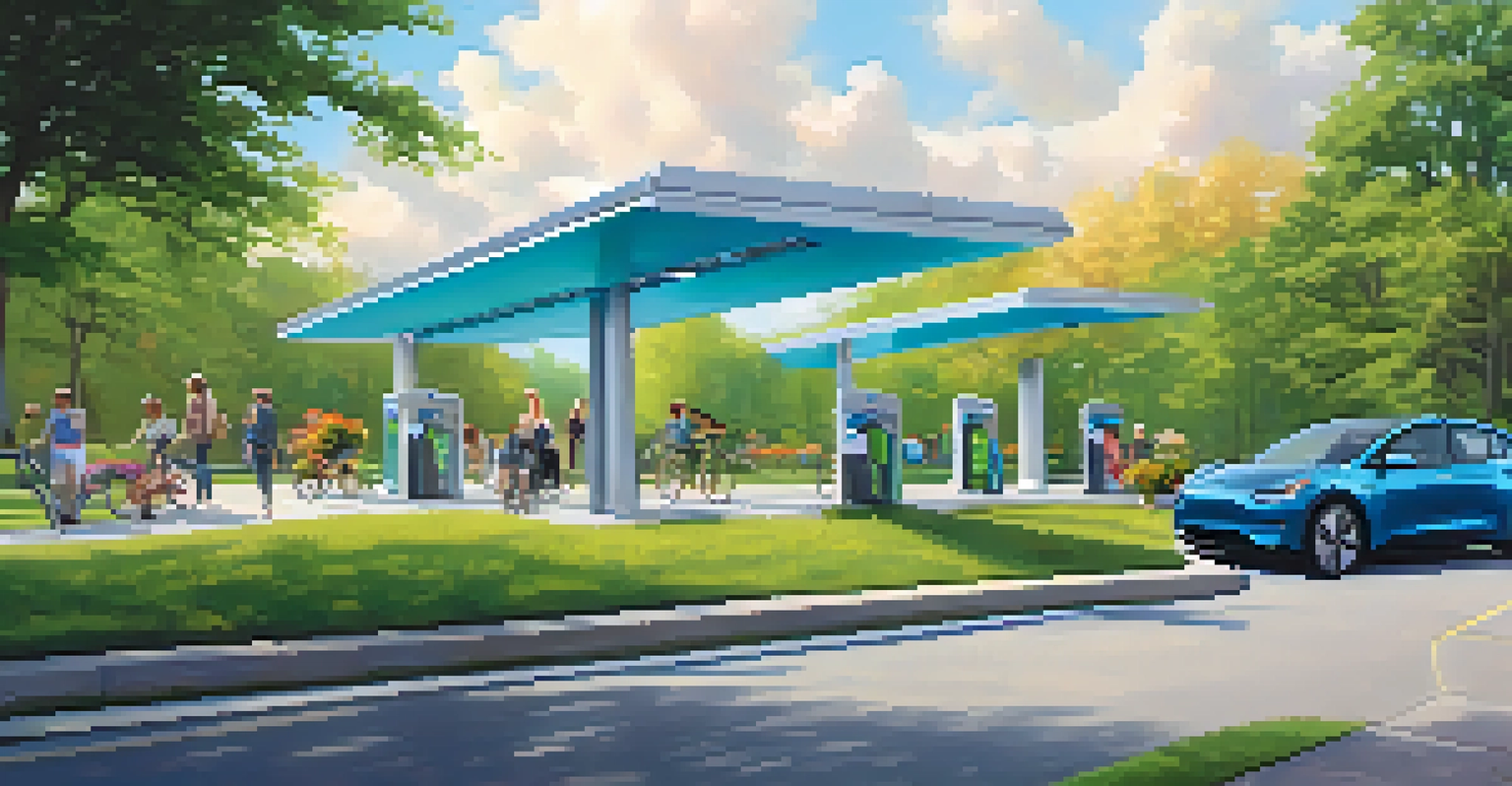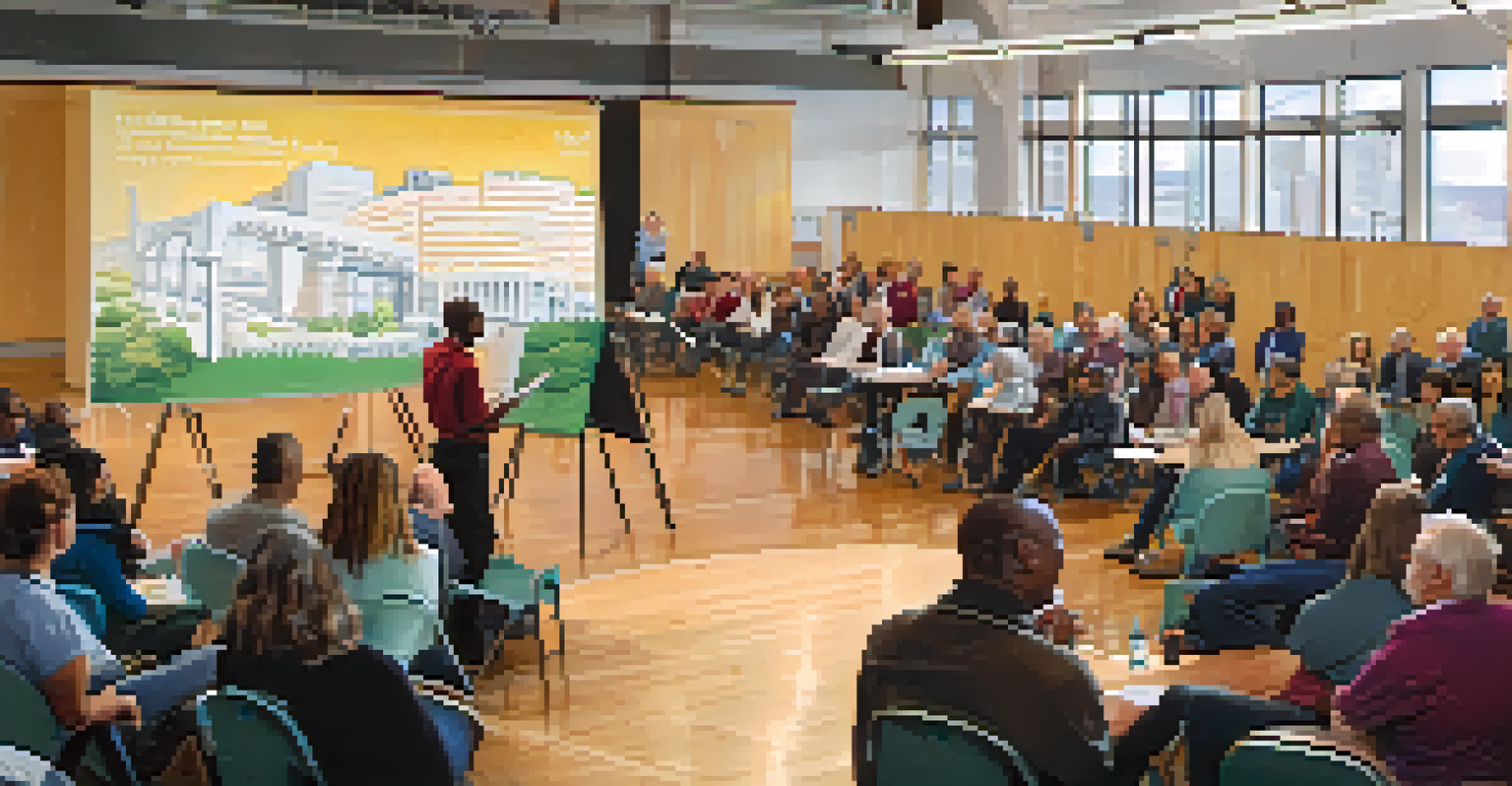Transport Innovations: Pittsburgh's Path to Sustainable Mobility

Pittsburgh's Commitment to Sustainable Transportation
Pittsburgh is making strides toward sustainable transportation, driven by a vision to reduce carbon emissions and enhance urban mobility. With the growing need for eco-friendly solutions, the city is focusing on innovative transport options that cater to the needs of its residents. This commitment is not just about improving infrastructure; it's about fostering a culture of sustainability in every aspect of urban life.
Sustainable transportation is the key to creating cities that are livable, accessible, and resilient for future generations.
The local government has launched numerous initiatives aimed at promoting public transit, cycling, and walking as viable alternatives to traditional car travel. For instance, the expansion of bike lanes and pedestrian-friendly zones is a clear indication of this shift. By encouraging these forms of transport, Pittsburgh aims to create a more accessible and healthier environment for its citizens.
Moreover, community involvement plays a significant role in these developments. Residents are encouraged to participate in discussions and provide feedback on proposed initiatives, ensuring that the solutions are tailored to the community's needs. This collaborative approach not only fosters trust but also empowers citizens to take an active role in shaping their city's future.
The Rise of Electric Vehicles in Pittsburgh
Electric vehicles (EVs) are becoming increasingly popular in Pittsburgh, aligning perfectly with the city's sustainability goals. The local government is actively promoting the use of EVs by installing charging stations throughout the city. This infrastructure development makes it more convenient for residents to switch to electric, reducing reliance on fossil fuels.

In addition to public charging stations, incentives such as tax credits and rebates are encouraging more people to consider EVs. These initiatives not only make electric vehicles more affordable but also contribute to a significant reduction in greenhouse gas emissions. As more residents embrace this green technology, Pittsburgh is well on its way to becoming a leader in electric mobility.
Pittsburgh Embraces Eco-Friendly Transit
The city is investing in sustainable transportation options, including public transit, cycling, and walking, to reduce carbon emissions and enhance urban mobility.
Furthermore, partnerships with local businesses help to foster a culture of sustainability. Companies are increasingly offering EVs as part of their fleets, showcasing their commitment to environmentally friendly practices. This not only enhances the city's image but also sets a precedent for other cities to follow.
Public Transit Innovations Transforming Commuting
Pittsburgh's public transit system is undergoing a renaissance, with innovative solutions aimed at making commuting more efficient and enjoyable. The introduction of smart technology is at the forefront of these developments, allowing riders to access real-time information about transit schedules and routes. This transparency helps commuters plan their journeys better, ultimately leading to a more seamless travel experience.
The best way to predict the future is to create it.
Additionally, the integration of various transit modes, such as buses, light rail, and bike-share programs, offers residents a holistic approach to mobility. By creating a unified system, the city is making it easier for people to transition from one mode of transport to another. This interconnectedness reduces wait times and enhances overall satisfaction with public transit.
Moreover, community outreach programs are educating residents about the benefits of using public transportation. By highlighting the environmental and economic advantages, the city is encouraging more people to leave their cars at home. As public transit becomes a more attractive option, Pittsburgh is paving the way for a future where sustainable mobility is the norm.
Walking and Cycling Initiatives Enhancing Urban Life
Pittsburgh is committed to making the city more walkable and bike-friendly, recognizing the importance of these modes of transportation in sustainable urban planning. The expansion of sidewalks and the addition of dedicated bike lanes are just some of the initiatives in place to promote active transportation. These developments not only improve safety for pedestrians and cyclists but also encourage a healthier lifestyle among residents.
Community events, such as 'Open Streets,' allow residents to experience the city without the usual traffic congestion. These events create a space for families to walk, bike, and engage with their neighbors, fostering a sense of community. By showcasing the city as a pedestrian-friendly environment, Pittsburgh is inviting more people to explore its neighborhoods on foot or by bike.
Community Involvement Drives Change
Active community participation in discussions and feedback ensures that transportation solutions reflect the needs and desires of Pittsburgh's residents.
Furthermore, educational campaigns aim to raise awareness about the benefits of walking and cycling. By highlighting the positive impact on health and the environment, the city is motivating residents to reconsider their commuting options. As more Pittsburghers embrace walking and cycling, the city is transforming into a vibrant hub of sustainable mobility.
Smart Technology Revolutionizing Urban Mobility
The integration of smart technology into Pittsburgh's transportation system is revolutionizing how residents navigate the city. Apps that provide real-time transit updates, route planning, and ride-sharing options are becoming essential tools for commuters. This technology not only enhances convenience but also empowers users to make informed decisions about their travel choices.
Additionally, the implementation of data analytics helps city planners to optimize transit routes and schedules based on actual usage patterns. By understanding how residents interact with the transportation system, the city can make data-driven improvements that directly benefit its citizens. This focus on innovation ensures that Pittsburgh remains at the forefront of urban mobility solutions.
Moreover, partnerships with tech companies are fostering a culture of collaboration that drives further advancements in transportation technology. By working together, the city and these companies can develop solutions tailored to local needs, ensuring that Pittsburgh remains a leader in sustainable mobility. As technology continues to evolve, the possibilities for improving urban transport are endless.
Community Engagement: Shaping the Future of Transport
Community engagement is a cornerstone of Pittsburgh's approach to sustainable transport innovations. The city actively encourages residents to voice their opinions and ideas regarding transportation projects, fostering a sense of ownership among the community. This collaborative spirit helps to ensure that the transportation solutions implemented are genuinely reflective of the needs and desires of the people.
Public forums, surveys, and workshops provide platforms for residents to share their thoughts on proposed initiatives. By taking the time to listen to the community, city officials can better understand the challenges residents face and create effective solutions. This participatory approach not only builds trust but also empowers citizens to take an active role in shaping their city's future.
Smart Tech Enhances Urban Mobility
Integrating smart technology into the transportation system helps optimize routes and improve the commuting experience for residents.
Furthermore, local advocacy groups play a vital role in connecting residents with city planners. These organizations work tirelessly to raise awareness about transportation issues and advocate for sustainable practices. By bridging the gap between the community and decision-makers, they ensure that Pittsburgh's transport innovations genuinely reflect the community's vision for a sustainable future.
Challenges and Future Outlook for Sustainable Mobility
While Pittsburgh is making significant strides toward sustainable mobility, challenges remain. Funding for infrastructure projects can be a hurdle, particularly in times of economic uncertainty. Ensuring that there is adequate financial support for ongoing and future initiatives is crucial to maintaining momentum in the city’s transport innovations.
Moreover, changing the mindset of residents who are accustomed to car-centric lifestyles can take time. Education and outreach efforts are essential to demonstrate the benefits of alternative transportation options. As the city invests in these initiatives, fostering a culture of sustainability will require ongoing commitment from both the government and the community.

Looking ahead, the future of sustainable mobility in Pittsburgh is bright. With continued investment in infrastructure, technology, and community engagement, the city is well-positioned to become a model for other urban areas. As Pittsburgh embraces innovative transport solutions, it not only enhances the quality of life for its residents but also sets the stage for a greener, more sustainable future.